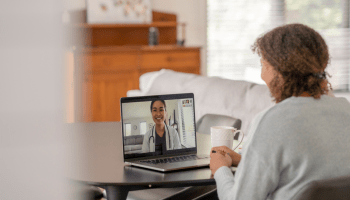The teleworking era – how to offer added value for the new needs
Teleworking is here to stay. And this 'new normal' demands different ways of working together - protecting people and relocating them - both for the teleworkers (people working remotely) and their organizations. The demand is also increasing for solutions that improve the teleworkers' comfort and health. What are the market needs of today, and how do you coordinate your offer with them in an innovative way?

The new normal – the challenge
With COVID-19 teleworking got an explosive boost. While only 16% of Belgians worked from home some or all days of the week before the corona crisis, that number tripled to 46% during it. Teleworking remains the norm – at least for those whose position allows it. Apart from that, recent studies show that Belgians have picked up a taste for teleworking. Six out of ten employees are eager to continue teleworking – on average, they find two days a week ideal. In addition to that, 60% claim that they are more productive at home and find a better work-life balance this way. Research shows that 68% of employees expect their organization to invest more in teleworking in the future. So, employers have work to do.
Structural teleworking solutions
Service providers, manufacturers and banks/insurers should also roll up their sleeves. Now that teleworking is a fact and corona has structurally changed our way of living and working, organizations are turning to you for structural solutions. Cybersecurity, mobility solutions, a new way of health support or assistance for business and private travellers, etc. are just a few of the challenges for which your customers and their teleworkers can use your support. Anyone who adjusts their offering in this regard or proactively develops new services and products and brings them to the market quickly, will be able to catch the new consumer’s interest before anyone else.
Prevent and remedy cyber risks
Anyone who asks their employees to telework structurally (i.e. on a regular basis) needs to draw up a teleworking policy and add it to the employment regulations. Employers are also obliged to ensure that their employees are able to do their work from home: with the right tools and devices, VPN connections, and, last but not least, with adequate security that protects their employees against cyber risks. After all, cybersecurity and privacy are the main challenges presented by teleworking. How do companies prevent their teleworkers from unintentionally directing cyber criminals to sensitive company data? But above all, how do they deal with the consequences of a possible security breach? Good victim assistance is certainly as important as a financial safety net at such times. And this does not only apply for the teleworker, but also for his family. Now that distance learning is gaining ground, children and young people are spending even more time online – with all the risks that entails. Online bullying or transgressive behaviour can cause a lot of psychological damage. Clear cyber insurance with an associated 24/7 hotline available for technical, practical, legal and psychological guidance when something goes wrong online, offers a good response to this rising market demand.
Ensure accessibility
The very concept of teleworking also assumes that employees are reachable from home for their customers, colleagues and business relations. A mobile phone is no longer only a nice convenience but also a vital communication tool in this context. A lost or defective smartphone has immediate disastrous consequences for business operations. So, today's employers are also demanding an all-in-one solution to ensure that their teleworkers have continuous accessibility. The Mobile Phone Insurance developed by AXA Partners is a one good solution for this. This provides mobile phone owners with a three-year repair and replacement warranty on their phones. And there is a team ready to immediately resolve any phone loss or damage. Our white labelling option allows businesses to integrated the solution into an existing offering faster, and the full service and assistance network are operational from day one.
Sustainable mobility – don't forget the cyclist
Sustainable mobility is certainly a hot issue now that we have discovered how to do things differently during the lockdown. For example, a recent study commissioned by Belgian Transport & Environment and the European Public Health Alliance shows that a majority of European citizens do not want air pollution in large cities to return to pre corona crisis levels. And it showed broad public support for redevelopment of urban spaces – even if this means less space for cars.
During the first months of the lockdown, Belgians turned back to cycling. A trend that continued when commuting/school traffic started again. For example, recent research shows that one in three young people who went to school by tram or bus before the corona crisis, now uses a bicycle. Adults are also increasingly switching from cars to bicycles. Bicycle sales have been steadily increasing for several years, but it is mainly the e-bike market that has peaked since the corona outbreak. From theft insurance to a mobile breakdown service for stranded cyclists, the demand is certainly there now.
Ergonomic well-being of homeworkers
Apart from cyber risks, there are also welfare risks that employers had better be aware of. Ergonomic workstations in the office are mandatory, and there are regular checks and adjustments. But what about the employee who works at his kitchen table at home? What if he or she develops neck and shoulder complaints as a result? Is that risk covered by the employer's insurance? A minimum requirement for healthy working at home is an adjustable office chair, a table or desk tailored to the teleworker, a large screen, a separate keyboard, and a mouse. A secluded area with adequate lighting and a perimeter zone depth of more than two metres is also recommended. Employers who have a framework agreement with a supplier of office furniture or supporting IT equipment (screens, laptop holders, keyboards, etc.) can extend this to their teleworkers. Online consultations to teleworkers, in which an ergonomist provides tips and tricks on how to set up their home workplace optimally and exercise advice to help them spend the working day in a healthier way, is certainly an idea worth investigating.
Digital doctor – at home and abroad
Health is a precious commodity, and we are now more aware of that than ever. Nowadays, more than ever, people want to have fast and comfortable access to healthcare wherever they are. And with the corona crisis, demand for digital medical assistance really has taken off too. Mental well-being can also come under pressure sometimes, now that people work from home or are confronted with illness, stress or burnout. Online health support and/or psychological first-line assistance is certainly not an unnecessary luxury. It is reassuring for both the teleworker who becomes ill or reaches his or her limits, and equally good for an employee who has to take a business trip abroad, to know that they have access to a Belgian doctor 24/7 Integrating such a service into your offering is not only a way to offer your customers added value. You also increase your touchpoints with this service.
Generous offer – service-service-service
Customer-oriented thinking and offering customer experiences are no longer only nice marketing terms. They have become necessities. People today expect companies to provide them with accessible and sustainable solutions to their challenges. Solutions that offer real added value, and are developed based on their specific needs. The COVID19 virus and its impact on life and work are the most pressing global and cross-demographic problem in recent history. Anyone who offers innovative services as a 'King of Customer Thinking' can count on greater brand loyalty.
AXA Partners Benelux works as an innovation partner with organizations that want to enrich their offering with customer-oriented assistance packages, assistance networks or smart insurance modules. Would you like to know more about this? Check out our real cases in the areas of co-creation and white labelling. Or feel free to contact us on:


